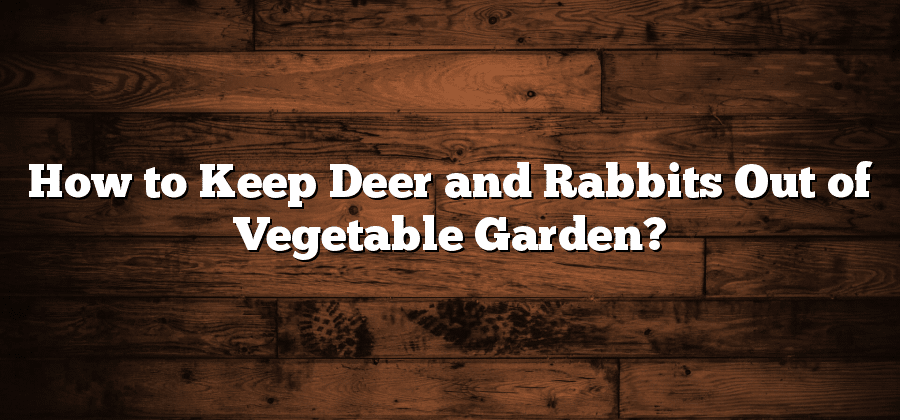Identifying Common Deer and Rabbit Damage
Deer and rabbits can cause considerable damage to gardens and landscapes, often leaving a trail of destruction in their wake. Identifying the signs of their presence and the extent of the damage is crucial in developing an effective plan to protect your plants.
One telltale sign of deer damage is the characteristic browse line found on plants. Deer have a habit of grazing on foliage, leaving a clearly defined line where they have nibbled. Additionally, deer tend to strip leaves and bark from young trees, causing them to wither and die. Rabbit damage, on the other hand, is often identified by gnawed stems and trunks, as well as clipped or chewed off vegetation. These small mammals have a particular fondness for tender shoots and young seedlings, making them especially destructive during the growing season.
Understanding the specific damage caused by deer and rabbits will help you develop methods to protect your garden. By recognizing the signs of their presence and the extent of the damage, you can take appropriate action to safeguard your plants and maintain a thriving garden.
Natural Repellents for Deer and Rabbits
When it comes to protecting your garden from deer and rabbits, natural repellents can be a valuable tool. These repellents work by emitting odors that mimic the scents of predators or by using taste deterrents that make plants unappetizing to these animals. Some common natural repellents include garlic spray, predator urine, and hot pepper spray. Garlic spray is known for its strong odor, which can help keep deer and rabbits at bay. Predator urine, such as coyote or fox urine, can create the illusion that predators are present, deterring these animals from entering your garden. Hot pepper spray, made with a mixture of hot peppers and water, is another effective option as the spicy taste repels deer and rabbits.
It’s important to note that natural repellents may need to be reapplied regularly, especially after rainfall or watering. Additionally, it’s a good idea to rotate different types of repellents to prevent animals from becoming accustomed to them. While natural repellents can be effective, they may not provide 100% protection, especially if deer or rabbit populations are high in your area. In such cases, it may be necessary to combine natural repellents with other methods to ensure the safety of your garden.
Creating Physical Barriers to Protect Your Garden
While some may find it challenging to combat deer and rabbit damage in their gardens, creating physical barriers can be an effective solution. These barriers serve as a physical deterrent, preventing these pesky animals from accessing your precious plants and vegetables.
One of the most common physical barriers is a fence. A sturdy fence can effectively keep deer and rabbits out of your garden, ensuring that they cannot feast on your crops. When constructing a fence, it is important to consider the height and material. Deer, in particular, are skilled jumpers, so a fence should be at least eight feet tall to prevent them from leaping over. Additionally, using a material that cannot be easily pushed down or dug under by rabbits is crucial. Wire mesh or chain-link fences are commonly used due to their durability and strength.
Using Scare Tactics to Deter Deer and Rabbits
One effective way to deter deer and rabbits from damaging your garden is by using scare tactics. These tactics aim to startle the animals and create an environment that they perceive as unsafe or threatening. By implementing scare tactics, it is possible to discourage deer and rabbits from entering your garden and protect your plants from their voracious appetites.
One commonly used scare tactic is the use of noise. This can be achieved by placing wind chimes or aluminum foil strips around your garden. The sound these objects produce as they move in the wind can startle the animals and make them hesitant to venture into your garden. Another option is to use motion-activated devices that emit sounds, such as ultrasonic repellents or even recordings of loud noises like barking dogs or screaming humans. These sudden and unexpected noises can also effectively deter deer and rabbits, causing them to flee the area and leave your garden unharmed.
Planting Deer and Rabbit Resistant Vegetables
Deer and rabbits can be a nuisance in gardens, often munching on our prized vegetables and flowers. Planting deer and rabbit resistant vegetables is one way to combat their destructive habits. By choosing the right plants, you can create a garden that is less appealing to these pesky creatures.
One option for deer and rabbit resistant vegetables is to focus on plants with strong aromas. These scents can help mask the smell of tasty vegetables and deter animals from venturing too close. For example, herbs like garlic, chives, and rosemary are known to have strong scents that repel deer and rabbits. Additionally, certain vegetables such as onions, leeks, and peppers can also emit odors that these animals find unappetizing. By incorporating these aromatic plants into your garden, you can help protect your other vegetables from being devoured.






